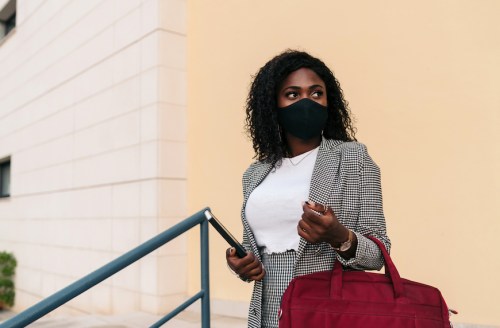Another Reason To Get Vaccinated? Many Insurance Companies Aren’t Covering COVID-19 Costs Anymore
We talked to experts about the recent report that says many major insurance companies are no longer covering COVID-19 costs.

The COVID-19 pandemic has cost us over four million lives; it’s stolen time with loved ones, economic security, and a general feeling of health and safety. But, until recently, getting COVID-19 didn’t financially cost insured people in the United States much.
Experts in This Article
José Pagán, PhD, chair and professor of the Department of Public Health Policy and Management at NYU School of Global Public Health.
Nicolas Ziebarth, PhD, economist and associate professor in the College of Human Ecology at Cornell University.
The U.S. government mandated that private insurers make COVID-19 testing free of charge, provided it was medically necessary. And, when vaccines became available, the federal government prepaid for vaccines and required they be administered at no out-of-pocket cost, whether or not you were insured. There were no government mandates requiring health insurers to cover costs like hospital bills or COVID-19 treatment from primary care doctors, but many major insurance companies waived those fees anyway.
According to a new report from the Peterson Center on Healthcare and Kaiser Family Foundation, approximately 88 percent of insured people would have had out-of-pocket costs waived during the first year of the pandemic if they were hospitalized for COVID-19—but that grace period is coming to an end. The report finds that 72 percent of the largest insurers in the U.S. are no longer waiving out-of-pocket fees for COVID-19 treatment, with another 10 percent of insurers planning to phase out waivers by the end of October. This development comes as the United States continues to see a rise in COVID-19 Delta variant cases.
With effective COVID-19 vaccines now widely available, insurers may no longer feel a strong pull to completely cover COVID-19 treatment, says José Pagán, PhD, chair and professor of the Department of Public Health Policy and Management at NYU School of Global Public Health. “There was an element of goodwill. Maybe even concerns about being perceived to be doing the wrong thing,” he says. When COVID-19 was rampant, unexpected, and very hard to avoid, insurers may have waived copayments in the interest of public health or because not covering them during a global health crisis would look bad.
“Now, you have more of a choice,” Dr. Pagán says. It’s no coincidence that many major health insurers started phasing out fee waivers in April, when safe and effective COVID-19 vaccines became more widely available. Getting both doses of either the Pfizer or Moderna vaccine is roughly 95 percent protective against serious illness and hospitalization from COVID-19. Because vaccines are free and easy to access, insurers may be less willing to cover copays for unvaccinated people who get sick from the virus.
For insured people, that can add up to thousands of dollars in treatment costs. “People who are on the fence—or didn’t get vaccinated because it wasn’t convenient or because there wasn’t an opportunity—should really consider that [getting COVID-19 treatment] could be very expensive,” says Nicolas Ziebarth, PhD, economist and associate professor in the College of Human Ecology at Cornell University.
Because insurance coverage and treatment needs vary so widely, it’s difficult to say exactly how much COVID-19 treatment would cost any individual person who has health insurance. But the costs are likely high. “If you get hospitalized and they have to put you on a ventilator and you’re there for a week, or two weeks, it gets very expensive,” Dr. Ziebarth says. “We’re talking about thousands of dollars.”
According to FAIR Health, the average cost of a COVID-19 hospital stay for an in-network insured patient is $38,221—and the amount the patient would pay depends on the cost-sharing agreement in their insurance plan. So Dr. Ziebarth suggests that unvaccinated people do the math. Calculate how much you’d have to pay out of pocket given your deductible, copays, and other fees from your insurance. “So at least you’re informed and know how much money is on the table,” he says.
For uninsured people or people seeing an out-of-network provider, FAIR Health estimates a COVID-19 hospital stay costs $73,300 on average. Of course, it’s important to note that these costs will vary depending on many factors, including where you get treatment and how sick you are. Uninsured people might be able to get a portion of COVID-19 treatment costs waived, under terms set up by the Health Resources and Services Administration Uninsured Program. If you’re uninsured and need treatment for COVID-19, you can ask your healthcare provider to request a claims reimbursement, which essentially has the government pay for your treatment instead.
However, programs like this tend to have a lot of red tape, Ziebarth explains. “The problem is, if you have an emergency condition and you need to be hospitalized, there’s no way you can inquire ‘Are you willing to bill the government?’” he says. While programs like the HRSA’s Uninsured Program can be helpful for uninsured people who need treatment, the best thing you can do to avoid costly hospital bills is get vaccinated.
COVID-19 vaccines protect against serious illness that would land you with massive hospital bills, with or without insurance. “Getting vaccinated will have a huge impact on the type of treatment you may need,” Dr. Pagán says. If you’re vaccinated and you get COVID, it’s unlikely that you’ll need to go to the hospital and face big treatment bills. “If you want to avoid all the trouble—get vaccinated,” Dr. Pagán says. “It’s that simple.”
Oh hi! You look like someone who loves free workouts, discounts for cutting-edge wellness brands, and exclusive Well+Good content. Sign up for Well+, our online community of wellness insiders, and unlock your rewards instantly.
Sign Up for Our Daily Newsletter
Get all the latest in wellness, trends, food, fitness, beauty, and more delivered right to your inbox.
Got it, you've been added to our email list.










